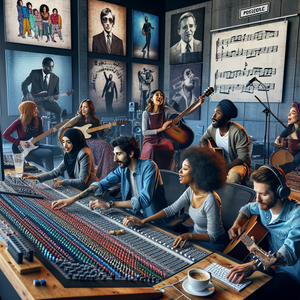Metronome Magic: Enhancing Your Creativity in Music Composition

Traditionally, a metronome is used to practice timing and rhythm, but its potential extends far beyond that. Composers can harness the metronome to explore various aspects of musicality, including unconventional time signatures, polyrhythms, and even emotional nuances in their work. By reimagining the metronome as a creative partner rather than just a tempo keeper, composers can unlock new pathways to innovation.
1. Experimenting with Time Signatures
One of the most effective ways to use a metronome creatively is to experiment with different time signatures. Instead of sticking to the standard 4/4 or 3/4, composers can set their metronome to less common signatures like 5/4, 7/8, or even 11/8. This shift challenges the musician to think differently about rhythm and phrasing, prompting fresh melodic ideas and structural variations.
2. Polyrhythmic Exploration
Polyrhythms can add richness and complexity to compositions. By using a metronome to maintain a steady pulse while layering contrasting rhythms, composers can delve into intricate textures. For example, setting one metronome to a quarter-note pulse while another ticks in triplets creates a fascinating interplay of rhythms.
3. Generating Emotional Dynamics
The metronome can also be utilized to enhance the emotional quality of a piece. By adjusting the tempo and introducing fluctuations, composers can evoke different feelings within their music. For instance, a gradual increase in tempo can build excitement, while a sudden slowdown can create tension or introspection.
4. Collaborative Composition
In collaborative settings, a metronome can serve as a shared reference point that encourages improvisation and spontaneity. When multiple musicians play together, establishing a steady beat with a metronome can free them to explore their creativity without losing the structural integrity of the piece.
5. Reflective Practice
Finally, using a metronome in reflective practice can help composers develop a deeper understanding of their creative process. By recording sessions with the metronome running, musicians can listen back to their improvisations and compositions, analyzing how the steady pulse shaped their ideas.
The metronome, often regarded as a mere tool for maintaining tempo, possesses immense potential as a catalyst for creativity in music composition. By exploring unconventional time signatures, experimenting with polyrhythms, generating emotional dynamics, fostering collaboration, and engaging in reflective practice, composers can unlock new realms of artistic expression.
Music Composer and Arranger
Film studios (e.g., Warner Bros), gaming companies (e.g., Electronic Arts), advertising agencies
Core Responsibilities
Develop original music compositions for various media, including film, television, and video games.
Collaborate with directors and producers to capture the desired emotional tone and style for projects.
Arrange and orchestrate music for different ensembles, adapting compositions for various instruments.
Required Skills
Proficiency in music theory and composition techniques, including the use of polyrhythms and unconventional time signatures.
Experience with music production software (e.g., Logic Pro, Sibelius) and sound design.
Strong communication skills for collaborative projects, often working with teams in studios or live settings.
Music Producer
Music labels (e.g., Universal Music Group), independent studios, freelance projects
Core Responsibilities
Oversee the entire production process of musical projects, from initial concept to final mix.
Work closely with artists to shape their sound and help realize their musical vision.
Utilize technology to manipulate sound, including the use of metronomes for timing and rhythm adjustments.
Required Skills
Deep understanding of recording techniques, mixing, and mastering processes.
Familiarity with various digital audio workstations (DAWs) and sound engineering principles.
Ability to balance creative vision with technical execution, ensuring quality output.
Music Educator (Specializing in Composition)
Schools, universities, private music institutions
Core Responsibilities
Teach music theory, composition, and performance to students at various levels.
Develop curriculum that includes innovative techniques, such as the use of metronomes for creative exploration.
Provide constructive feedback on students' compositions and guide them through the creative process.
Required Skills
Strong background in music education and pedagogy, with an emphasis on composition.
Experience in diverse musical styles and teaching methods that encourage creativity.
Patience and adaptability to cater to different learning styles and skill levels.
Sound Designer
Film production companies, game development studios, theatrical organizations
Core Responsibilities
Create and manipulate audio elements for various media, including films, video games, and theatrical productions.
Collaborate with composers and directors to develop soundscapes that enhance storytelling.
Experiment with rhythmic and textural elements, using tools like metronomes to explore timing.
Required Skills
Proficiency in sound design software (e.g., Pro Tools, Ableton Live) and an understanding of acoustics.
Ability to work creatively under pressure, meeting tight deadlines for project releases.
Knowledge of music theory to effectively integrate compositions with sound design.
Music Therapist
Hospitals, rehabilitation centers, schools, private practice
Core Responsibilities
Utilize music as a therapeutic tool to help clients improve their emotional, cognitive, and social skills.
Develop individualized treatment plans that may include composition and improvisation techniques.
Facilitate group sessions that encourage creative expression through music, potentially using metronomes to aid rhythm and timing.
Required Skills
Certification in music therapy and a strong understanding of psychological principles.
Ability to create a safe and supportive environment for clients to explore their emotions through music.
Strong interpersonal skills to build rapport with clients from diverse backgrounds.


